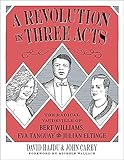A revolution in three acts : the radical vaudeville of Bert Williams, Eva Tanguay, and Julian Eltinge / David Hajdu and John Carey.
Material type: TextDescription: 1 online resource : illustrationsContent type:
TextDescription: 1 online resource : illustrationsContent type: - text
- computer
- online resource
- 9780231549547
- Williams, Bert, 1874-1922 -- Comic books, strips, etc
- Tanguay, Eva, 1878-1947 -- Comic books, strips, etc
- Eltinge, Julian, 1883-1941 -- Comic books, strips, etc
- Entertainers -- United States -- Biography -- Comic books, strips, etc
- Vaudeville -- United States -- History -- 20th century -- Comic books, strips, etc
- PN2285 .R486 2021
- COPYRIGHT NOT covered - Click this link to request copyright permission: https://lib.ciu.edu/copyright-request-form
| Item type | Current library | Collection | Call number | URL | Status | Date due | Barcode | |
|---|---|---|---|---|---|---|---|---|
 Online Book (LOGIN USING YOUR MY CIU LOGIN AND PASSWORD)
Online Book (LOGIN USING YOUR MY CIU LOGIN AND PASSWORD)
|
G. Allen Fleece Library ONLINE | Non-fiction | PN2285 (Browse shelf(Opens below)) | Link to resource | Available | on1255522419 |
Includes bibliographical references.
"An African American who performed in blackface to challenge racial stereotypes; a woman whose song, "I Don't Care," became emblematic of the modern "New Woman"; and a female impersonator whose act was created to uphold the traditional values of American femininity. These stories are at the center of David Hajdu's new work of graphic nonfiction, which recounts the lives and careers of Bert Williams, Eva Tanguay, and Julian Eltinge, three of the most popular and influential vaudeville performers at the turn of the twentieth century. Hajdu's history reveals how popular American entertainment as we know it first took form in vaudeville, and the ways these three artists challenged conceptions of race, gender, and what it meant to be an American during a pivotal time in the nation's history. Hajdu and the artist John Carey intertwine the stories of Williams, Eltinge, and Tanguay with sections that focus on subjects relating to their lives and careers, such as the histories of minstrelsy or gender-bending in American theater. The book tells how the West Indian Bert Williams found a balance in his act that at once played to and challenged ideas of Blackness in American life. Eva Tanguay, who was known as "The Queen of Vaudeville," embodied a fiercely radical challenge to the prevailing conceptions of female propriety. Julian Eltinge, to whom Tanguay was briefly "engaged," created a precise impersonation of the dainty, graceful proper woman, while maintaining an offstage persona of hypermasculinity. Hajdu and Carey conclude the book by examining how these artists influenced the acts and personas of later performers ranging from Elvis Presley to Prince to Nikki Minaj"--
Frontmatter -- Foreword -- A revolution in three acts -- Sources and Further Reading
COPYRIGHT NOT covered - Click this link to request copyright permission:
There are no comments on this title.
